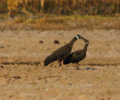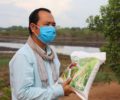Joint Press Release: Rare Birds Population Shows Signs of Increase
Phnom Penh City, 11th January 2023
Joint Press Release
Rare Birds Population Shows Signs of Increase
The White-shouldered Ibis is one of the rarest birds in the world and faces a high risk of global extinction if threats continue, including hunting trapping and habitat loss. From a global population of only perhaps 1,000 birds a coordinated census across Cambodia in 2022 recorded 792 birds, nearly 80% of the global population.
The White-shouldered Ibis (Pseudibis davisoni) was once found across Southeast Asia, but today the species is restricted to the dry forest landscapes of northern and eastern Cambodia, and another much smaller relict population on the island of Borneo. The species is classed as Critically Endangered, the highest category of threat for a species, on the IUCN Red List.
In 2009, the Ministry of Environment (MoE), Forestry Administration and conservation organizations started to jointly monitor the Cambodian White-shouldered Ibis population by counting the birds in their wet season roosts. Conducted monthly from July to October, the ibis are counted as they first enter and then leave then roost the following morning. This makes estimating both the population size and the trend possible. From the highest count in 2013 of 973 birds, the numbers recorded have declined to 531 in 2018, a decrease of 47%. During those five years Cambodia suffered high levels of deforestation for economic land concessions. This habitat loss, combined with disturbance at nesting and roosting sites, has had a significant impact on the Cambodian population.
In 2022, for the fourth year in a row, the census counts show higher numbers. This result is very encouraging suggesting that conservation measures, or better counting at least in some areas may account for the higher total.
The highest counts are recorded at Siem Pang Wildlife Sanctuary (377) and the Mekong Flooded Forest (326). Smaller counts are made at Koh Srolay, Kulen Promtep, Lomphat, Srepok and Phnom Prich Wildlife Sanctuaries. The annual census surveys are coordinated by the members of the Cambodian Ibis Working Group (CIWG), made up of the Ministry of Environment, Forestry Administration, Angkor Centre for the Conservation of Biodiversity (ACCB), NatureLife Cambodia, Rising Phoenix, Wildlife Conservation Society (WCS), and World-Wide Fund for Nature (WWF).
H.E. Net Pheaktra, Secretary of State and Spokesperson, Ministry of Environment said “The Royal Government of Cambodia thanks all Conservation’s partners to join efforts to protect and conserve natural resources and wildlife, as the result show an increase the number of wildlife species including White-shouldered Ibis. This demonstrates the effectiveness of the implementation action plan of the Ministry of Environment and an organization partner and the demonstrated improvement of natural resource conservation in Cambodia, people awareness raising and the changing publish attitude with wildlife. The Ministry of Environment and NGO partners will continue their effort to provide safe habitats to wildlife through law enforcement, local economic supporting, and other education campaigns to change public behavior. The Ministry of Environment continues to aware on people to stop trapping, hunting, eating wildlife meat, and wildlife trade.”
World Wide Fund for Nature (WWF) Cambodia Country Director Mr. Seng Teak congratulates the rising number of White-shouldered Ibis population trends in Cambodia – a result of concerted efforts in conserving this critically endangered species in the world. With at least 326 white-shouldered Ibis recorded along with 17 roosting sites in Sambo Wildlife Sanctuary, the number of white-shouldered Ibis population in the Mekong Flooded Forest has increased by 29% in 2022 from 252 birds in 2021. “WWF is delighted and congratulates the positive result of the White-shouldered Ibis survey. We thank Ministry of Environment, all members of the Cambodian Ibis Working Group (CIWG), local community and relevant stakeholders who involved in this conservation efforts,” he continued, “As member of CIWG, WWF commits to working together with responsible authorities, NGO partners and local communities to safeguard this critically endangered bird species through support to law enforcement and community-based habitat and nest protection. We stand ready to collaborate on the joint conservation action efforts to thrive for stronger survival of this rare species.”
Mr. Jonathan Charles Eames OBE, CEO of Rising Phoenix Co. Ltd. said “At Rising Phoenix we make a great effort not only to count roosts but have taken steps to protect the largest roost site which falls outside Siem Pang Wildlife Sanctuary. Our dedicated team devotes significant time and resources to finding and monitoring white-shouldered Ibis nests and finds about 45 per annum.”
Mr. Bou Vorsak, Director of NatureLife/BirdLife in Cambodia said “Cambodia supports the largest of population of White shouldered Ibis in world, the 2022 census result indicates a promising future. NatureLife Cambodia would like to thank the Ministry of Environment for leading the Cambodia Ibis Working Group. We are delighted to support this species working group to develop and implement the Cambodian ibis conservation action plan to protect the critical endangered ibises from extinction”.
Media contact:
H.E. NET Pheaktra
Secretary of State and Spokesperson
Ministry of Environment
Mobile: +855 12 483 283
Email: pheaktra.neth@moe.gov.kh
BOU Vorsak
Director of NatureLife/BirdLife in Cambodia
Mobile: +855 12 222 073
Email: vorsak.bou@naturelifecambodia.org
Tagged:



